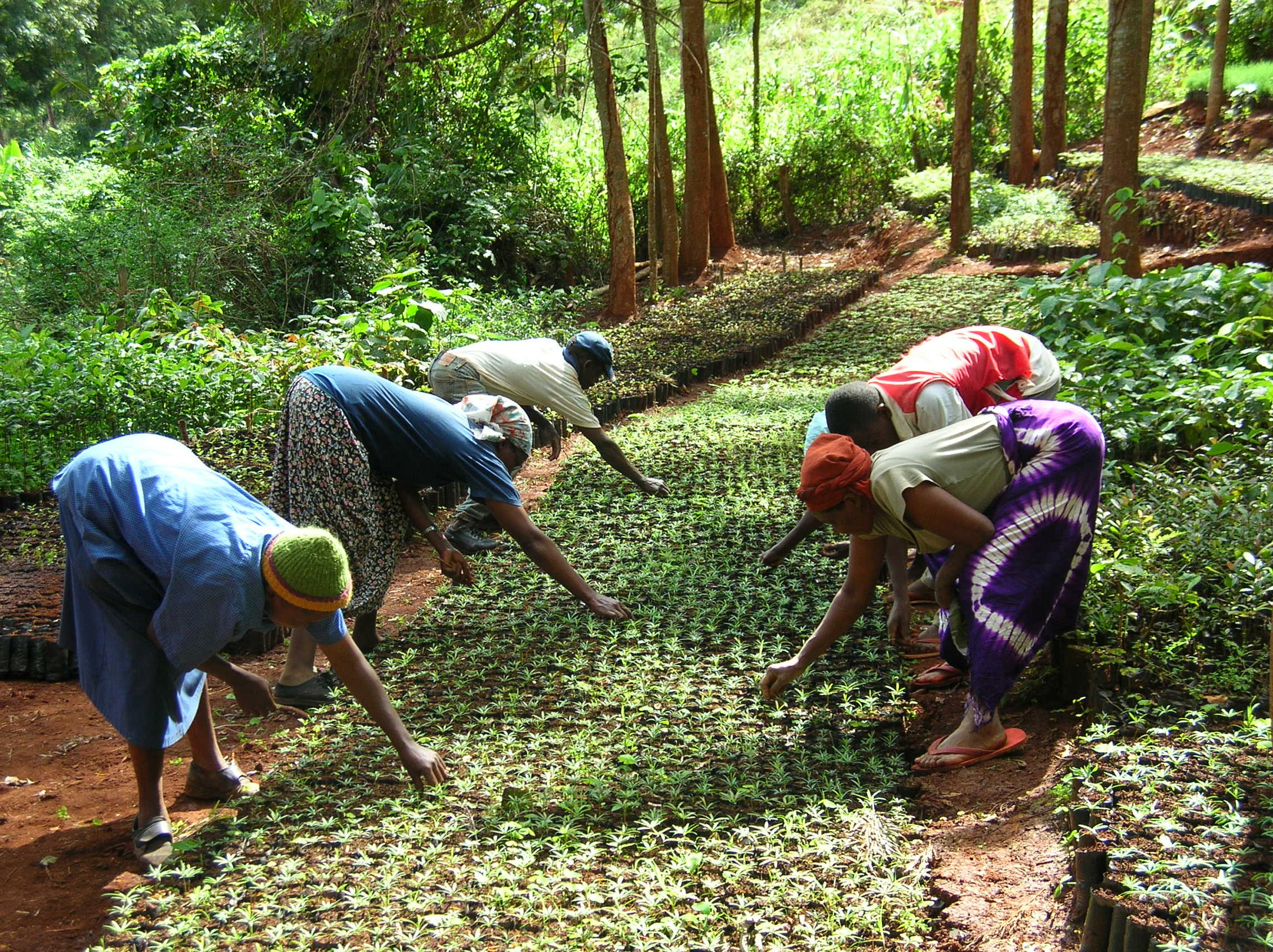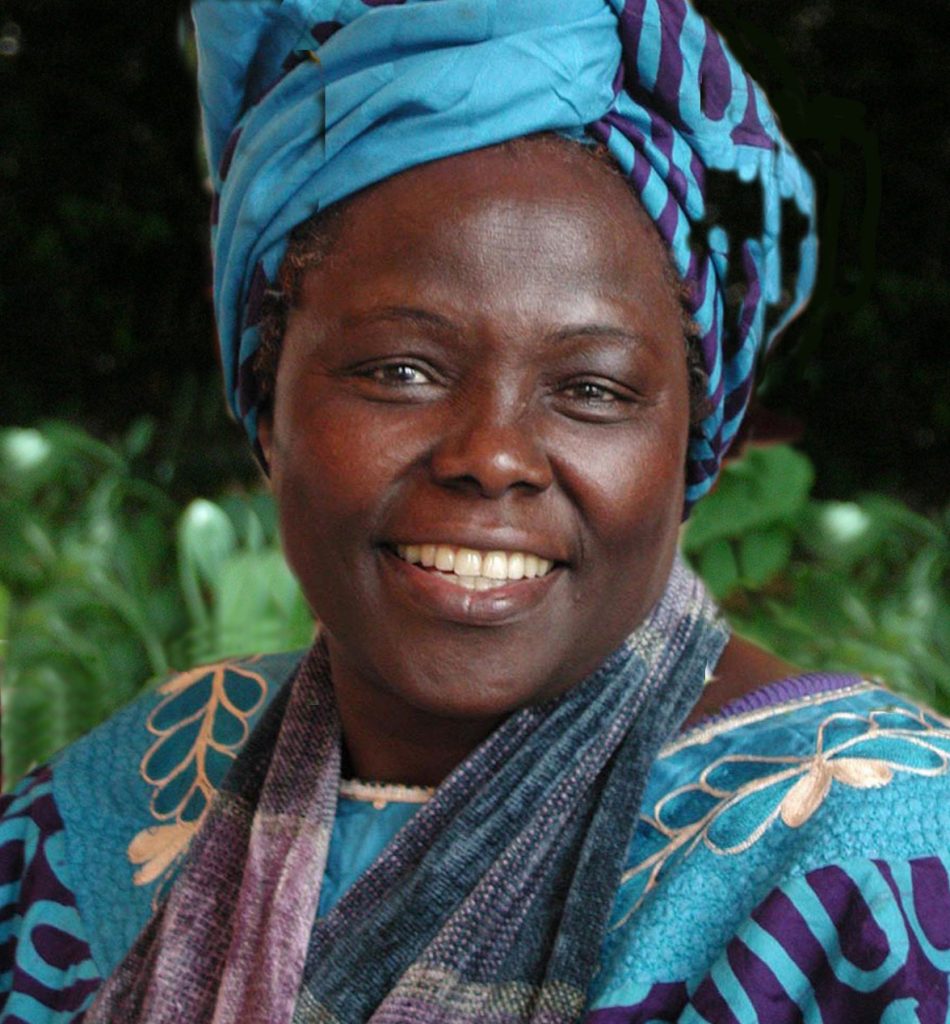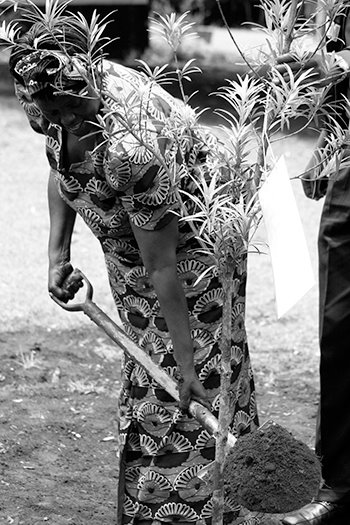
In the Fall of 2007, Parabola sat down with Nobel Peace Prize winner Wangari Maathai. The conversation appeared in our issue, “Holy Earth,” and is available to purchase here. If you have enjoyed this piece, consider subscribing.
Wangari Maathai is the founder of the Green Belt Movement, which has planted forty million trees over the last thirty years throughout Kenya, her native country. It was for this work, as well as for her advocacy for democratic rights and social justice, that Professor Maathai was jailed and beaten during the despotic regime of Daniel arap Moi, and for which she was awarded the Nobel Peace Prize in 2004. Born in 1940, educated primarily by Catholic nuns, Maathai was the first East African woman to earn a Ph.D., in veterinary medicine. She is the author of The Green Belt Movement: Sharing the Approach and the Experience and Unbowed: A Memoir. Martin Rowe talked with her recently about the spiritual importance of Kirinyaga (Mount Kenya) to her people, the Kikuyu of the Central Highlands of Kenya; and about the spiritual dimension of her activism, and what trees mean to her.

Parabola: Why was Kirinyaga so important to the Kikuyu?
Wangari Maathai: Human beings often cannot express verbally what they mean or the depths of their feelings, so they use symbols. Mount Kenya represented the immensity, beauty, incomprehensibility, and sacredness of creation. The mountain is very tall, about 17,000 feet above sea level. It spans the equator, and has glaciers and over three hundred rivers. The people around the mountain were overwhelmed by its beauty and power and thought that God must live there. So they protected and revered it. It was a very important spiritual symbol among the people, who could see the mountain from wherever they were. Unfortunately, sometimes these symbols are trivialized—like when people tell you that God does not live in Mount Kenya but in heaven and you are persuaded to believe it and then you desecrate the mountain. You allow it to be ploughed, the trees to be felled, marijuana to be planted. It’s because the symbol has been destroyed. This is what has happened to Mount Kenya in the century or so since the missionaries arrived. I know that God does not live on Mount Kenya or in heaven. God is everywhere. However, the mountain is still central to the lives of the people who depend on the rain that falls and the waters that flow from there. The mountain as a symbol still expresses its importance in people’s lives because without this mountain they would actually stop living in that area. Their lives would be completely threatened.
P: You clearly have a sense of wonder still. Why don’t others share that?
WM: I’m not sure I am particularly special. However, when you revere, you do not plunder; you protect. When you do not, you plunder; because your mission is to accumulate and take something before somebody else. That concept of accumulation and privatization is responsible for our failure to recognize that we are required to take what we need from the environment and leave the rest for future generations. This was very common in the traditional societies everywhere.
P: How do we rediscover that reverence?
WM: I don’t know. But, amazingly, many times when people have accumulated so much around them, they find the need to reach out and give. They may not call it spiritual, but it gives them a spiritual calmness when they share and give away what they have accumulated. I find that interesting, because they are going back to the original concepts of the need to share, care, and ensure that others are not suffering.
P: Is it guilt?
WM: I don’t know if it’s guilt; but caring, sharing, and giving is a very deep need in our humanity. Even the poor will share the little they have. But those who have accumulated a lot find it necessary to go back to those very basic feelings. If you go back to many traditional societies before industrialization and modernization you’ll find that people did that. So those are very basic values of humanity, of what it means to be human.
P: In your memoir you honor both the wisdom of your people and the knowledge the Catholic nuns gave you. How have you managed to reconcile the concept of dominion present in Genesis with Kikuyu tradition?
WM: Because I was educated by religious people, I’m associated with a certain church or a certain religion, and I practice. But at the same time I come from the roots of a people who did not have religion as we know it today, but were very spiritual in the way they related to what they would have called their creator. So in some ways I sometimes find myself caught between the two of them, unable to differentiate what is spirituality and what is religion. In following in the footsteps of my people, there was always a very clear understanding that you were a steward. Dominion was a very Christian, Western thing. It is perhaps what is behind the desire to dominate, to privatize and accumulate, which now dominates the whole world. As the message of domination spread, communities who had that concept of stewardship were called primitive and uncivilized, and many of them became persuaded that the thing to do was the opposite: dominate. Many of them weren’t able to compete, because domination was very strong and linked to industrialization and the inventions that made that domination possible. Those who didn’t have that concept found themselves literally at the mercy of the forces of those dominators. It is very interesting that the churches today are talking about custodianship and calling upon the people to take care of the earth. But it is a new voice that is being put forward in the midst of a world that has become so dominated, exploited, and so subdued—as some parts of the Bible say.
P: Do you read the Bible or use it in your work?
WM: The books of Genesis and Leviticus I use a lot. The Psalms are very inspiring, because when you read them, you can almost see the different experiences that David had. Sometimes he was dejected, sometimes inspired, sometimes compassionate. You can see the human being. There was a psalm I used to read when I was in trouble: Psalm 3: “O Lord, how many are my foes! How many rise up against me!” Because I did have many people against me. “I lie down and sleep; I wake again, because the Lord sustains me.” That was very important.
P: Is planting trees a spiritual practice for you?
WM: I’m sure it’s a combination of both ecological and spiritual, because I’m sometimes doing it out of a conviction that I’m trying to conserve that which was created and has been destroyed. But it is also true that you’re doing something very physical. As you do that, you’re almost participating in the act of the creation.

P: Does it give you a feeling of connection to the earth?
WM: It has made me feel that I am part and parcel of that earth; that if something is done badly to that earth it is being done to me also. I’m hurt when I see the earth being hurt: a tree being cut, the soil disappearing. This work makes you feel very close to the elements. You become aware that whether you are alive or dead, you are still part of it. Again, talking about the spirituality of our people, the Kikuyu, those who died did not go to a place known as heaven; their spirits were still with us. And that was very important for the people, because they felt the ground was where their relatives were. They were in the forest or on the mountain. That made them feel as though they were part of the past and the future. You couldn’t destroy the land because you were destroying your ancestors, and if you did you’d have nowhere to go when you died or no place to be born into. Your whole being revolved around the land.
P: Does that sense of continuity between the past and present animate your work?
WM: I think it’s very important for us to remember that many other people have come before us and have made this planet a better place—all the prophets we read about. In our time, we have been called to pass a different kind of message than the prophets on making this place better. And there will be others after us. We must appreciate that we who feel the call and the challenge are the ones with the responsibility. Those who have not received the message may not have the responsibility. We who know must do our best. So sometimes I say to people, “Do not interfere with what I’m doing, because I understand, and I have to carry the burden.”
P: Do trees have a spiritual meaning for you?
WM: Quite often, I see trees as human beings upside down: because we humans have legs and we feed ourselves through our mouths, and the trees feed them themselves through the roots. So it’s as if they have dug themselves upside down and their legs and hands are dangling out. When I look at the trees I see living things, and every tree seems to have its own personality, its own identity. Some are tall, some are short, some are literally small on the ground. But they are all alive. They die when we cut them, and they disintegrate just like us.
P: Perhaps they’re wiser than we are.
WM: They are doing what they think they should. They are directed by their genome, and so what wisdom there is, is in their genome. They seem to do very well wherever they are, and they are very important to our lives. Of course, because we have control over them, we can destroy them—at our own peril. But left to themselves, you’d almost think they would say, “Let me live, because when I live, you live.” We are so dependent on them. ♦
